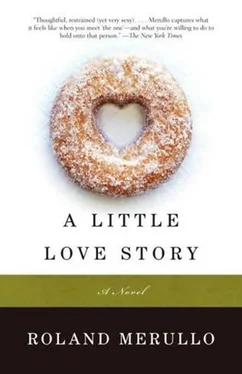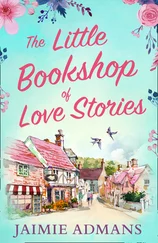When I had eaten half my eggs and potatoes and finished my first cup of coffee, I took Janet’s note out of my pocket. I unfolded it, smoothed out the wrinkles, and set it on the counter-top beside my coffee cup, where I could study the handwriting and the words.
THAT AFTERNOON I put on a summer sport coat over my T-shirt and drove half an hour west to visit my mother. She was living then in one of the leafier suburbs, not far from where I had grown up, in a place called Apple Meadow. People cooked her meals and cleaned her room, and there was a garden with white metal chairs set around a fountain, and manicured lawns, and an activity room with a television and a card table. Doctors, nurses, physical therapists, cleaning women, receptionists-everyone I’d ever spoken with at Apple Meadow seemed competent and caring, and you couldn’t find a surface with dust on it if you were paid to, and there was really no other place my mother could have been as happy and safe, or treated as well. But every time I drove up to the guardhouse and gave my name I felt like some kind of traitor, a good enough son wearing a thin suit of selfishness.
She was sitting in an armchair in the sunny visitors’ room, gold and diamond earrings my father had given her sparkling at the sides of her face, hands resting in her lap. She might have been waiting for me or she might not have been. At sixty-seven, she was the youngest person there. Probably the healthiest, too, except for the fact that her mind-which had been a wonderful mind-had started to travel down roads that were closed off to most other minds. She recognized me when I came through the door, though; her neatly trimmed eyebrows lifted a quarter of an inch and she flashed her small, pretty smile, one corner of one top front tooth chipped away from when she had tried to bite the flip top off a can of Pepsi. “Ellory!” she said, holding out her arms. “Doctor Entwhistle!”
A year before, just about the time when everything had changed for me, she had started calling me by my brother’s name. She had also started talking to me as though I were a physician-which is what she had been, which is what I’d been expected to be. It was as if she somehow understood that my happy enough little world had just been blown up, and her response to that was to make me into someone else, as if that might let me slip free of the pain. After trying various other strategies, I had finally decided to play along. As a pretend-doctor, I could at least accompany her a short way down some of the roads she traveled. I could do a better job of bringing that light to her face when I walked into the visitors’ room. Somehow, by some interior mechanism I did not understand, my being a doctor partly rebuilt the connection that had been broken by her illness. I could sit again in a skewed version of the warmth and generosity I’d grown up with, and once you’ve had that kind of affection in your life, you are marked by it forever. What my mother had given me, given us, was exactly what Gerard had not been given enough of as a boy. He and I talked about that sometimes.
That day, Mum and I walked the neat grounds of Apple Meadow, around and around, back and forth. It was the new pattern: sometimes she held my arm and was quiet. Other times she said things like this: “It’s not a question of money, Ellory. Money just represents something else, an agreement to value one thing over another. Only children don’t have this value put on them because children have one foot in the ocean and pay no attention. It terrifies us, this ocean. But the fear of drowning is absurd. We already are drowned.”
“Exactly,” I’d say, and we’d stroll along like intellectuals on holiday in Baden-Baden.
And then, at some point after it had circled and circled and spun off in a series of nonsensical eddies, the conversation would drift back to her old world, the world of medicine, the world of being paid to care about other people’s pain and fear. It was very strange because, in that world, whole sectors of my mother’s memory and thought processes had been left undamaged, and it always sent a happy jolt through me when the conversation went there and we were actually almost making sense again.
“How is your practice?” she would ask, with so much pride in her voice that it made me wish I’d stayed in med school. “What interesting cases have you seen recently, Doctor Entwhistle?”
Sometimes, before visiting her, I’d go on Gerard’s computer and spend an hour researching exotic illnesses. One Saturday we’d talked at length about intestinal parasites in children, and the strange variety of symptoms they could cause. The Ebola virus fascinated her, and had led us to leeching and leukemia. Her mind was a library in which certain floors and sections of stacks had no electricity, and others were still well lighted enough for reading.
“I have a patient with cystic fibrosis now,” I told her on that day, because I had not been able to stop hearing Janet’s voice as she lay in the darkness.
“Horrible,” my mother said. “A ghastly disease. A torturer. A killer of children.”
“Young adults now, mostly,” I said. “They’ve made some advances.”
“You’re more in touch with these things than I am.”
“She’s twenty-seven, my patient. Almost the statistical mean age of death now.”
“Ah,” my mother said, sounding surprised. She spent a little while searching around in her interior darkness. “Pseudomonas bacterium ?”
“Yes.”
“Constant coughing? Digestive troubles?”
“Pancreatic enzymes,” I said, and with that, I came to the end of what I knew.
“Horrible, horrible.”
We walked another few paces. “What causes it, Mum?”
She turned her stone-blue eyes up at me. “What causes it? You must have slept through the lecture that day, Ellory. Are you asking seriously?”
I nodded.
“A gene. A defective gene.”
“I know that ,” I said, and gave a little fake chuckle. “But at the cellular level. What is the exact… what is going on?”
“Salt and water don’t pass between the cells easily enough, the mucus is thick, the skin is salty, haven’t you noticed? It’s one tiny mistake. A glitch.”
“There are new drugs being developed,” I ad-libbed. “There’s talk of a cure in the not-too-distant future. I wanted to ask you what you’d recommend in the way of treatment.”
“Not my area of expertise.” She swung her hands out, palms up, her ring finger wobbling slightly as I had seen it do a thousand times. “But they have identified the gene, as you know.”
“Yes.”
“Done some work with new antibiotics.”
“Yes, that’s right.”
“What I would suggest is that you go and speak with Doctor… at the Beth Israel. With Doctor… Doctor…”
I could feel the change sweeping through her. It was as if she’d managed to escape from a great heavy demon and run a few steps back toward sanity, and then the demon had caught her from behind, wrapped itself around her, and was now in the process of dragging her back into the darkness. Her muscles stiffened. Her face puckered, turning up the fine light hair on her cheeks. Four, five, six times she tried for the doctor’s name: “You really must consult with Doctor… Doctor… Ellory, it’s Doctor…” At last she surrendered and let herself be dragged back. When she spoke again we were miles apart. “Gwendolyn Mitchell and her brood of six went to the minister’s house for Sunday dinner, you know, and once the squash was served you couldn’t find a place to sit at the table, can you imagine?”
There was a connection somewhere, I knew that. I had some understanding of the ways her mind worked now. Maybe one of the Mitchells had suffered from cystic fibrosis. Maybe the doctor’s name at Beth Israel was Mitchell or his wife or assistant was Gwendolyn. Sometimes the word my mother was searching for would pop up again an hour later, in the midst of another conversation, or as we were saying good-bye, or when I spoke with her on the phone in the middle of the week.
Читать дальше












